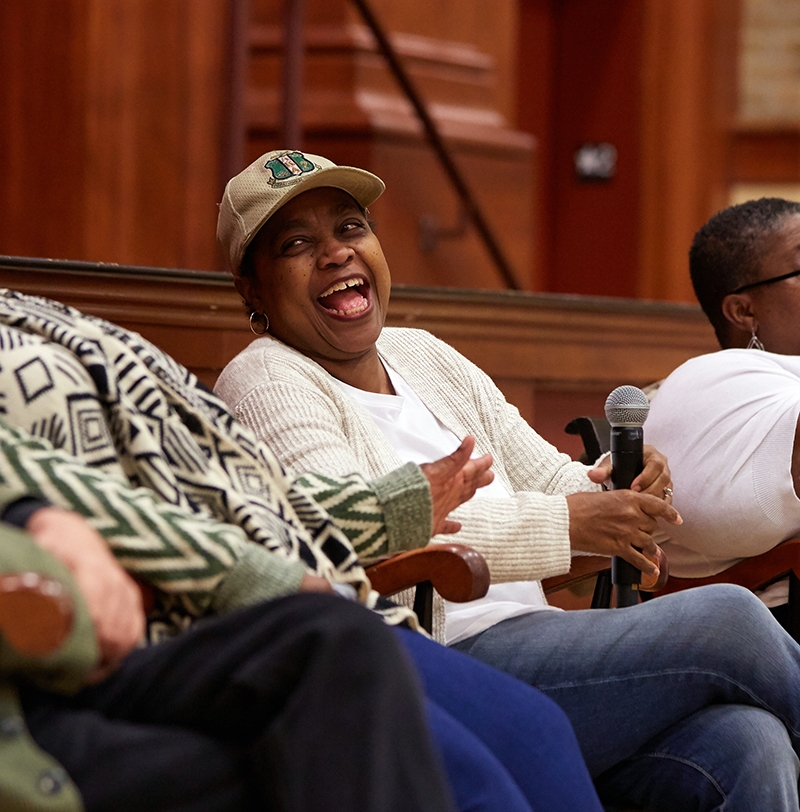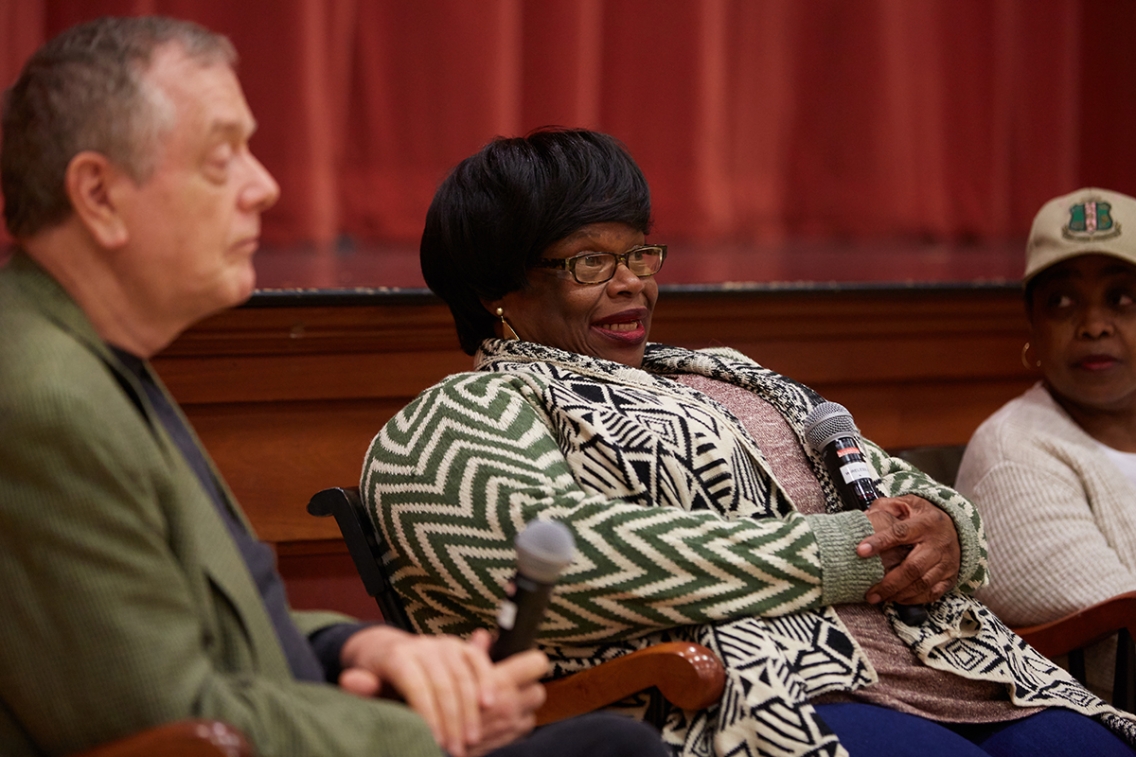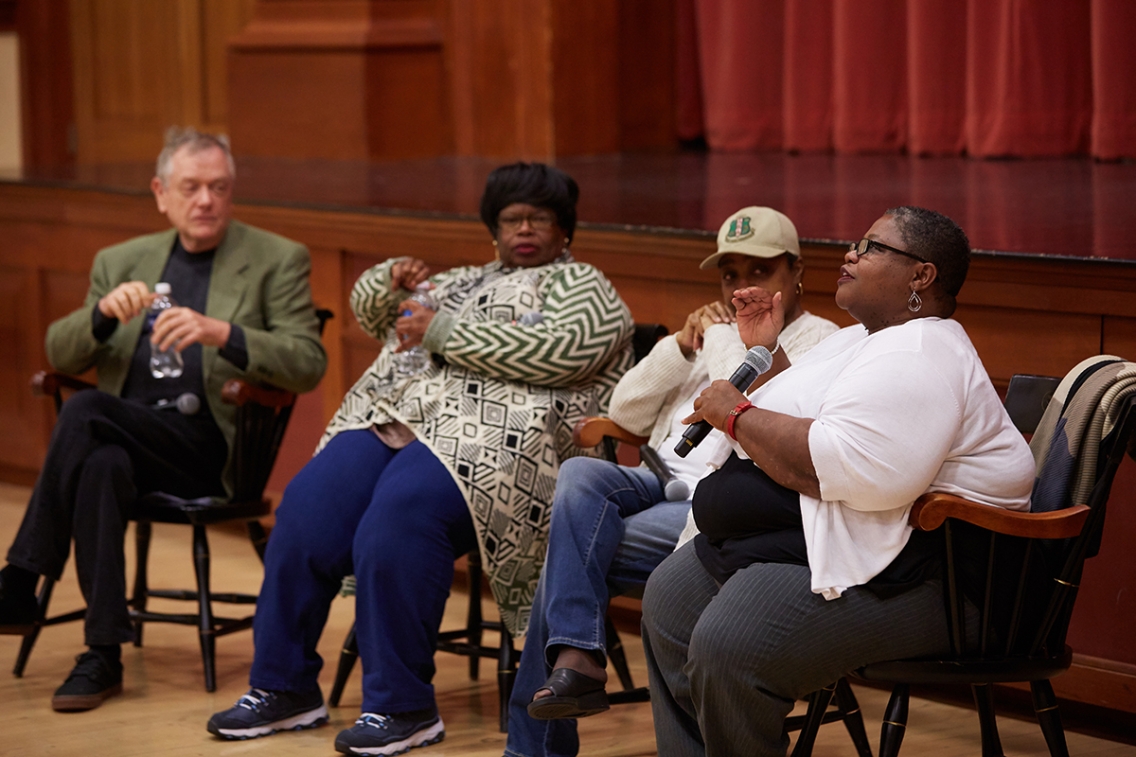Fifty Years Later, Friends Discuss Racism and School Desegregation

MIDDLEBURY, Vt. – In 2016, the writer Jim Grimsley spoke at Middlebury about his painful awakening to racism at the start of school desegregation in his small hometown of Pollocksville, North Carolina. He described, in particular, three young black girls who walked into his sixth grade class on the first day of school, sparking a lifelong journey of self-examination on how to cope with his own internal racism.

Almost exactly a year after that first Middlebury appearance, at the urging of President Laurie Patton, Grimsley returned to campus–this time sharing the stage with his three former classmates, who had pioneered those early days of integration in a small, rural school. It was the first time the group had been together in one place since they finished school. For nearly 90 minutes, the four friends traded stories and recollections–many painful, some funny–from those early days.
Grimsley said that in his book, How I Shed My Skin: Unlearning the Racist Lessons of a Southern Childhood, he tried to convey that he was raised to be racist and still is racist because that is not training you ever forget.
“But, on a particular day when I was 11 years old, I was confronted with my racism in such terms that I could not deny it, and I wanted to change it,” said Grimsley. “One of the reasons I wrote the book was to make it possible for people to understand that you can own the racism that’s in you, do something about it, and not let it defeat you or be the end of your life. I’m talking to white people when I say that, and that’s the journey that we should all be on.”

Author Jim Grimsley with Rose Strayhorn Bell and Donnie Copeland Meadows at Wilson Hall on October 26.
On that fateful day back in sixth grade, when the teacher had stepped out of the classroom, Grimsley hoped to get a laugh from his classmates by taunting one of the new girls. “You black bitch,” he said to her.
Given everything he thought he knew about black people, he expected she would cower, feel ashamed, and passively agree that she was inferior. But her reaction set him on his heels. In a booming voice she shot back, “You white cracker bitch!” He was dumbfounded, shocked by the girl’s fearless self-confidence, which contradicted everything he had been taught about how she should respond.
The girl who stunned Grimsley into silence that day, Rose Strayhorn Bell, now in her 60s and a dear friend of Grimsley, sat next to him on the Wilson Hall stage. Bell said the choice to go to the new school was completely hers.
“My parents did not decide for me,” she said. “I told them I wanted to go over to the white school. I wanted to know what they were learning.” She said in those days the white schools got new books and the black schools were given the used books after the white students were done with them.

Fernanda Copeland tells an audience about attending a newly desegregated school in 1966 in rural North Carolina.
Bell, a lifelong resident of Pollocksville, said she felt well-grounded in her own self worth and confidence in her academic abilities. Nonetheless, it was a difficult year as she endured taunts and other harassment in the classroom whenever the teacher, who Copeland later described as a “functioning alcoholic,” left the room.
Donnie Copeland Meadows and Fernanda Copeland, sisters 11 months apart, ended up in the same class with Grimsley and Bell, but their background was different. They had moved to the small town from Washington, D.C., where schools were already integrated. They knew what it was like to attend school with kids of many different races and their father, a career military man, felt they should attend what appeared to be the best school.
“I was not nervous,” said Copeland. “I knew that I needed to go because we were taught that anything in life that you want, you have to work for it. And education was the key. Without the education, you could not do anything. So, I wanted to learn, I wanted to go on and achieve different things.”
Like Bell, Copeland entered the school resolute and self-confident, but still endured continual harassment from other students. “It was surreal when I look back on it,” she said. “But when we were there, we were just going to school, making friends.”
Copeland said when her family first moved to North Carolina, there were black-only water fountains and black entrances to the movie theater, and to go into restaurants they had to walk around to the back–none of which they had experienced living in D.C.
“That was eye-opening for us,” said Copeland. My dad kept saying, ‘This is not how it’s supposed to be. You guys need to get an education and you’ve got to make this better. Do not be afraid to speak up, but do it respectfully and your character will carry you far.’”
As the three advanced into high school, they encountered new forms of racism. A high school teacher was quoted as saying that “black people are the scum of the earth,” prompting a walkout by students. The protesters were suspended for 15 days.
By the time they entered high school, academic tracking had become a new form of segregation. In their school black students represented 70 percent of the student body, but only 30 percent of the students enrolled in the “college prep” program.
Although each of the three women said they were grateful for their education that led them to college and beyond, they said those early days of school integration also came at a cost from within the black community. They were at times called sellouts, Uncle Toms, and ‘hassadiddy,’ a slang term for uppity, said Copeland.
Toward the end of the talk, one student, who identified himself as white, asked about concrete steps he and other people of privilege could take to help address racism and educate others. In answering him, Grimsley followed his own story line: “What you can do is change you,” he said. “I had one audience where a man was saying to me over and over ‘This will never change, this will never change.’ I told him, ‘It’s easy to think that, but if you go and stand in front of the mirror and tell yourself this is who I am and I can be different, then something has changed. And if everyone could find the strength to do that, then a lot would change.”
Reporting by Stephen Diehl; Photos by Todd Balfour

